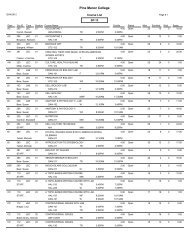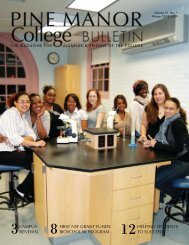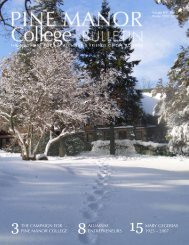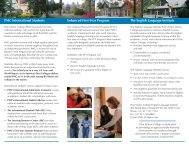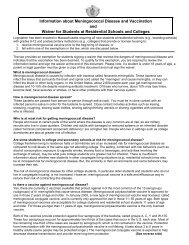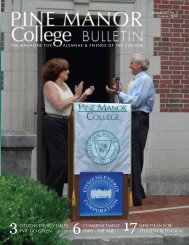internship programLast fall 58 seniors participated in the <strong>College</strong>’s required internship program,which gives students real world experience and an advantage in theirjob search after graduation, and provides service to the local community.The seniors worked at 52 locations, including the governor’s office, televisionstations, hospitals, banks, and community organizations.At a reception in December honoring interns and their site supervisors,interns spoke enthusiastically of how transforming their internships hadbeen and of the mentoring they received. Site supervisors praised PMCinterns for the skills and positive work ethic they contributed to their organizations.Several of the site sponsors have hosted PMC interns for anumber of years, and many students have been offered jobs.Clyde Hicks, an on-air personality at Cambridge Community Television,said of intern Ingrid Oge: “She brought so much creativity and energy toIn 2008 President Gloria Nemerowicz signed the American <strong>College</strong> &University Presidents’ Commitment, signifying the <strong>College</strong>’s intention todecrease its reliance on fossil fuels and seek ways to reduce, reuse, and recycle.The <strong>College</strong> also partnered with Citizens Energy Corporation to achieve thesecomplex and challenging goals.An essential part of the commitment and the partnership was the need todetermine the <strong>College</strong>’s carbon footprint. To determine the footprint, two students--Aneesah Cameron ’<strong>10</strong>, a Business major, and Wislande Cherenfant ’11,a Biology major-- worked with Dr. Elizabeth Gardner in a summer internship.Cameron and Cherenfant were sponsored by Citizens Energy Corporation,receiving grounding in the formula for calculating our carbon foot print,while Dr. Gardner taught them mini-classes on where the carbon came from.Citizen’s Energy provided a complex spread sheet that focused everyone onan updatemy shows. She’s been co-hosting on both my radio and tv show and she’sput a lot into my format, which has been completely made over and is nowmuch more professional.” Oge added, “My work at the tv station has beenterrific...It helped me build my confidence and I learned so much.”Judith Connelly of Marlborough Hospital said, “We were very happy tohave Amy Fraser as our intern. She worked very hard at completing a projectfor our patient education committee and is now finalizing the hospital’spolicy to manage all the outpatient brochures.” Fraser commented: “Duringthis internship I learned to be confident in my work and I worked hard tocreate a policy that, hopefully, will be used for years to come. I learned howto conduct myself, how to take myself seriously, and to take my work veryseriously.”The Search for <strong>Pine</strong> <strong>Manor</strong>’s Carbon Footprint14 PINE MANOR COLLEGE BULLETIN | www.pmc.eduthe required data, including gallons of heating oil used, number of commuters,pounds of fertilizer, number of automobiles on campus, number of incandescentlight. The Year 2007 was selected for the baseline data and <strong>2009</strong> for thenew data.The students fanned out across the campus seeking information, with <strong>College</strong>staff opening box after box of bills. The students worked through the summeron this frustrating task, accumulating the information and entering it on thespread sheet.Although we all thought this task would be accomplished by summer’s end,the number has yet to be crunched. During the spring semester, the <strong>College</strong>’scarbon footprint will be determined for 2007 and <strong>2009</strong>, and the students willrecommend changes to President Nemerowicz.-- Professor of Biology Elizabeth GardnerconversationsconversationsBy Dan Bohrs, ELI Program Director, and Rhonda Seidman, ELI Executive DirectorDuring the past semester collaboration between the faculties and studentsof the <strong>College</strong> and the English Language Institute intensified significantly.In November students from Professor Michele Ramirez’s psychology classinterviewed international students from ELI about customs and attitudesin their home countries. Countries represented in ELI’s current studentbody include: China, Columbia, Dominican Republic, Italy, Ivory Coast,Japan, Korea, Taiwan, Turkey, Venezuela and Vietnam. What was abundantlyclear in the classroom was a kinetic form of education in which allparticipants were engaged, concurrently playing the dual roles of teacherand student.Among the many topics discussed were cultural attitudes toward time,what constitutes a “family,” how one adapts to a new culture, and the needto break down barriers between people’s preconceptions and stereotypes.During the session, students were able to overcome their reserve in meetingpeople from different backgrounds and discovered that their commonalitiesexceeded their differences. The ELI students felt more accepted andunderstood by the <strong>Pine</strong> <strong>Manor</strong> community as represented by ProfessorRamirez’s students while the <strong>Pine</strong> <strong>Manor</strong> students had a window openedto other cultures and viewpoints during the spirited interaction.Marlise Dosreis, a sophomore majoring in Management andOrganizational Change, had her preconceptions of Asia challenged whenshe met Kwangsuo Choi, an ELI student from South Korea. She becameaware that her family and Choi’s family share similar values, despite beingfrom different continents, so she went from having “stereotypes in mycross culturalmind” to concluding that despite “a different language and different ethnicbackground” that “inside we are very similar.”The period flew by and students who were accustomed to watching theclock near the end of class found themselves so fully engaged that they reluctantlyprepared to leave and enthusiastically exchanged e-mail addresseswith their new-found friends.ELI students also had a wonderful opportunity to practice their Englishskills with PMC undergraduates in Professor Stephen Thompson’s FirstYear Seminar – “Make and Believe-We are the Stories We Tell.” PMCstudents interviewed ELI students to learn their “stories”: about their backgrounds,heritage, traditions, what led them to take courses in the UnitedStates, their aspirations, and where they see their life experiences leadingthem.In speaking about the class, Professor Thompson said, “What we hope isthat these conversations will lead to cross-cultural learning and increasedinteraction between the PMC and ELI students because we believe thatthese students are important resources for each other.”Cindy O’Neil, ELI Academic Coordinator, commented that “This is‘Language in Action.’ The more situations that can be provided wherestudents can be engaged in real life language, the more confidence they willhave in actually using what they have learned in class.”<strong>Winter</strong> 20<strong>10</strong> 15
{ around campusPMC Outreach to Haitian Students and StaffBy Whitney Retallic, Director, Center for Inclusive Leadership and Social ResponsibilityThe <strong>Pine</strong> <strong>Manor</strong> <strong>College</strong> community was saddened and shocked by thenews of the earthquake that devastated Haiti in January, especially becauseour community includes 40 students and 5 staff who are Haitianor Haitian-American. Our initial efforts focused mainly on reaching outto and supporting our affected students and staff and getting a sense ofthe losses they suffered. Nearly all have received reports of injured or lostrelatives and other loved ones.Two days after the news of the earthquake, 60 members of the PMC community– staff, faculty, PMC students, ELI students, and Art Institutestudents, gathered for a brief ceremony of remembrance and hope.Ronda Zelezny-Green, Director of Multicultural Affairs in Student Lifeand Director of Youth Leadership Programs in the Center for InclusiveLeadership and Social Responsibility, opened the ceremony with wordsabout the rich history of Haiti, the strength and fortitude of the Haitianpeople, and the compassion we all have for the country as they struggleto rebuild. Ronda’s comments were followed by a reflection from FatherWilliam Joy, Priest at St. Angela’s (Mattapan, MA) and St. Matthew’s(Dorchester, MA), two of Boston’s Catholic churches with significantHaitian populations, including several of our students. Following amoment of silence, a number of those gathered spoke the names of lovedones affected or shared a prayer or thought.Currently, we are encouraging donations of money to reputable organizationsand we are collecting medical supplies, working with theMassachusetts-based organization Partners in Development, which hasa medical clinic in Port-Au-Prince that was unharmed. In addition tocounseling our current students, our Counseling Center staff has offeredto consult with any <strong>Pine</strong> <strong>Manor</strong> <strong>College</strong> graduate who needs support and/or assistance.The <strong>College</strong> has established a Haiti Support Fund, which focuses on assistancefor the Haitian members of the PMC community. As their needsand those of their families become clearer, we anticipate working with themto help in their recovery.A group of students, staff, and faculty continue to meet to coordinate reliefand support efforts for our affected community members, as well as theHaitian community as a whole.{ HAITI Fund for Students & Employees EstablishedLetter to PMC community from President Nemerowicz, 25 January 20<strong>10</strong>We have come together in spirit and deed in response to the terrible toll the earthquake in Haiti has taken onthe people there and those in our own community who have family and friends there. Our support for ourHaitian students and employees is on-going and remains a high concern.We know that the need for compassion and connectedness will last for weeks and months and perhapsyears. In order to assist the Haitian members of our community and their families, the <strong>College</strong> is establishinga fund that we hope will grow with time and can be used for a variety of purposes. The Haiti Fund has beenlaunched by two anonymous donors who are employees of the <strong>College</strong>. If you would like to join them insupporting this fund, whose use will be restricted to support for Haitian students and employees impacted bythe earthquake, please send your donations to the Presidents Office. Checks can be made payable to <strong>Pine</strong><strong>Manor</strong> <strong>College</strong> with an indication that your donation is to be directed to the Haiti Fund.I will establish a committee to review statements of need and make recommendations.Thanks to all of you who, each day, are helping those in need get through these profoundly distressing times.GloriaEducators Discuss Cross-Campus Collaborationto Maximize Experiential Learning OutcomesBy Carol Axelrod, Director, Access/Success InstituteThirty-five educators gathered on <strong>Pine</strong> <strong>Manor</strong> <strong>College</strong>’s campus inDecember to talk about experiential learning initiatives for low-incomeand first-generation-to-college students. Hosted by PMC’s Access/Success Institute, the event allowed participants an opportunity to exchangeinformation about what works on their various campuses, and todiscuss their students’ experiential learning needs. Participating were ninelocal colleges and six non-profit college access organizations: Bunker HillCommunity <strong>College</strong>, <strong>College</strong> of Holy Cross, Eastern Nazarene <strong>College</strong>,Mount Ida <strong>College</strong>, <strong>Pine</strong> <strong>Manor</strong> <strong>College</strong>, Regis <strong>College</strong>, Simmons <strong>College</strong>,Stonehill <strong>College</strong> and Wentworth Institute of Technology and ACCESS,<strong>College</strong> Advising Corps, Dynamy, Early <strong>College</strong> High School at HolyokeCommunity <strong>College</strong>, Hyde Square Task Force and YouthBuild Brockton.PMC and Aramark Host Sustainability Fairby Terry Dion, Assistant Director, Dining ServicesIn November the <strong>College</strong> teamed up with Aramark Dining Services andthe PMC Green Club to host the third sustainability fair. Held once eachsemester, the fairs ask students to act as responsible stewards of the planet’slimited natural resources, to think about their own carbon footprint, and toconsider joining the Green Club.A number of the <strong>College</strong>’s vendors participated in the event, explaining thesteps they have taken to be sustainable or green. Aramark’s table featuredhomemade and organic oatmeal cookies and infused fruit water; and, as aresult of the positive response, both items have been added to the regular offeringsin the Residential Restaurant. It was also announced that Aramarkhas eliminated bottled water from all catered events on campus.The Sustainability Fair was followed up at the beginning of second semesterwith the <strong>College</strong>’s participation in RECYCLEMANIA, a national recyclingcompetition involving most major universities and colleges. As part ofPMC’s effort in this project, the Green Club sponsored a number of rallies,advertised on campus, and held a dorm competition between PMC, NewEngland Art Institute, and English Language Institute students.PMC to HostUN’s Beijing + 15 Conference<strong>Pine</strong> <strong>Manor</strong> <strong>College</strong> will be the site of the New EnglandBeijing + 15 Conference on April 17, with PresidentGloria Nemerowicz as co-chair. The Conference is partof the assessment by the UN Commission on the Statusof Women of the Beijing Declaration and Platform forAction (1995) and the outcomes of the 23rd specialsession of the General Assembly (2000). About 250people are expected to participate.Annenberg Library JoinsMinuteman Library NetworkBy Marilyn Bregoli, Director, Annenberg LibraryThe Annenberg Library became the newest member of the MinutemanLibrary Network (MLN) in July. This new partnership offers easy accessto over 6,000,000 titles compared to the 350,000 titles available in theWEBnet consortium to which we previously belonged.The Network is a consortium of 42 libraries with 64 locations workingtogether to share resources and services. Members include seven collegelibraries and 35 public libraries in the Metrowest region of Massachusetts.<strong>Pine</strong> <strong>Manor</strong> <strong>College</strong> library card holders enjoy borrowing privileges at allMLN institutions. The shared web-based catalog offers an easy interfacefor finding books, periodicals, and audiovisual materials, made possibleby a computerized system that includes an online catalog and circulationcontrol. Library users can locate material by author, title, subject, or keywordand see whether an item is currently on the shelf or checked out. Patronsmay reserve material that is checked out or request that an item be sent toAnnenberg from another library in the Network, with daily delivery serviceto Annenberg.Response from the PMC community has been overwhelmingly positive.We hope alumnae will take advantage of our exciting new partnership.Please call the Library at 617-731-7081 if you would like to obtain anAlumnae library card; if you live in a Minuteman community, you can useyour existing public library card to request materials from the Annenbergcollection.Annenberg Library is also now on Facebook. Become a fan of the Library!Visit the Library’s web site for more information: http://www.pmc.edu/library.Project Credit Smart Features PMCStudent on WBZ TV – Channel 4Zenova King ’<strong>10</strong> was a featured interviewee with reporter Peg Rusconi in apiece on “Project Credit Smart” that ran four times on September 15, <strong>2009</strong>on WBZ TV –Channel 4, the Boston CBS affiliate.“Project Credit Smart” is a yearlong program offered by The ConsumerAffairs and Business Regulation Office in Massachusetts. King was suggestedfor the interview by Undersecretary of Consumer Affairs BarbaraAnthony, who made a presentation on campus during New StudentOrientation. As part of the presentation, King was the featured speakerfor the kick-off of “Project Credit Card.” The <strong>College</strong> was recognized forits work in turning students into savvy consumers, and was designated as anew partner of the Office of Consumer Affairs.December <strong>2009</strong> GraduatesFive students completed their BA programs and received their diplomasin December. They are entitled to participate in the commencement inMay. The five are Rika Maeda of Hyogo, Japan who earned a degree inManagement and Organizational Change; Amber Mushtaq of Randolph,MA, Economic and Financial Systems; Maiko Oyanagi of Yokohama,Japan, Liberal Studies; Krystle Richardson of North Providence, RI,Economic and Financial Systems; and Donna Whalen of Worcester, MA,Communications.16 PINE MANOR COLLEGE BULLETIN | www.pmc.edu <strong>Winter</strong> 20<strong>10</strong> 17



